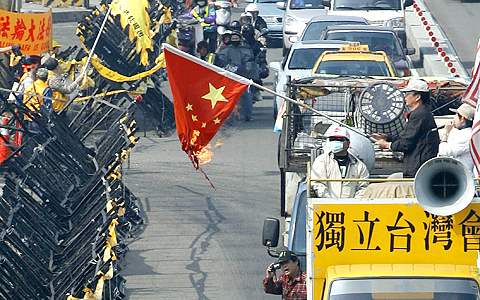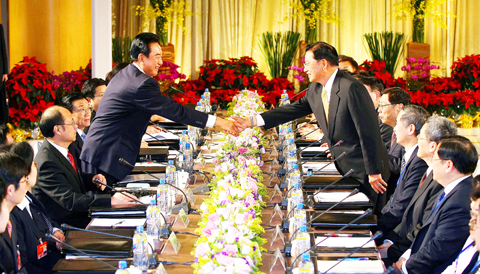Taipei and Beijing yesterday signed three agreements and agreed to place the economic cooperation framework agreement (ECFA) on the agenda at the next round of cross-strait talks next year.
The deals signed yesterday — on the fishing industry, quality checks of agricultural products, and standardizing inspections and certification — bring to 12 the number of pacts inked by the two sides since President Ma Ying-jeou (馬英九) assumed power in Taiwan in May last year.
Yesterday’s agreements were signed by Straits Exchange Foundation (SEF) Chairman Chiang Pin-kung (江丙坤) and his Chinese counterpart, Association for Relations Across the Taiwan Strait (ARATS) Chairman Chen Yunlin (陳雲林), in the afternoon. The two had met in the morning to discuss the agreements as well as the previous nine agreements and one consensus signed at previous talks and the agenda for the next round of cross-strait meetings.

PHOTO: REUTERS
The two sides had planned to sign four agreements yesterday, but a pact on tax matters such as avoiding double taxation was dropped at the last minute because of “technical” problems following a preparatory meeting on Monday.
Both sides said more negotiations were needed and hoped to sign the accord “at an appropriate time.”
Chiang said the three pacts signed yesterday reflected the goal of cross-strait negotiations, which he said was benefiting the public and protecting their rights.

PHOTO: CNA
Chiang and Chen agreed to list the ECFA as the “major issue” for the next round of talks. The other issue was intellectual property rights.
Chiang said signing the ECFA “brooked no delay” because it was the “key” to Taiwan’s economic development and was the “will of the people.”
Chen said the ECFA would be “purely economic” and that various studies had shown its effects would be positive.
“Our attitude on the matter has always been positive,” he said.
Many in the Democratic Progressive Party (DPP) believe Ma’s China-friendly push is setting the stage for an eventual Chinese takeover of Taiwan. The DPP says signing an ECFA would flood Taiwan with cheap Chinese products, prompting massive job losses and making Taiwan overly dependent on China.
Chen said he understood there were different opinions in Taiwan about the pact, but that many Taiwanese businesses were worried about economic integration in the region and wanted to see both sides sign an accord.
Chen said all the agreements signed since the two sides resumed negotiations last year benefited the public.
“Nobody can reverse the trend of peaceful development across the Taiwan Strait,” he said.
Yesterday morning, Chiang also brought up the fact that the previous nine agreements had not been fully implemented.
Chiang said although all of them had produced “substantive results” for the people on both sides of the Strait, there was still room for improvement. This includes increasing the number of Chinese visitors, which he said remained far below the target. The number of direct flights to certain destinations in China should also increase, he said.
He also voiced concern over China’s handling of compensation requests following last year’s melamine scandal. Chinese milk products were found to be contaminated by the industrial chemical, leading to heavy losses for Taiwanese importers, who then filed claims for compensation. Chiang hoped the Beijing would urge and assist local governments to handle the matter.
Furthermore, many white-collar criminals who have fled to China have not been repatriated, he said, hoping to see this situation improve, he said.
Chen said the agreements signed with China may benefit certain industries, but eventually the economic and social benefits would reach the public.
He said both sides over the past 19 months had made great achievements, but that things could not be perfect in such a short period of time. However, both sides had a responsibility to improve, he said.
Chen said he believed the problems could be solved through the good communication established over the past year.
“Some problems have arisen since we signed the agreements. Some agreements have yet to be realized or fully realized,” Chen said. “Everybody thinks we should increase flights. We have already begun consultations on this.”
At the signing ceremony yesterday afternoon, Chiang gave Chen a pottery vase featuring two birds looking at an ear of rice. The SEF said it symbolized peace and prosperity. Chen gave Chiang a framed lacquerware piece from Yangzhou bearing the Chinese characters for peaceful development and featuring peonies to represent the new climate of cross-strait relations and a white dove symbolizing cooperation between the people on both sides and their “strong desire to see peaceful development.”
At a separate setting yesterday, Mainland Affairs Council (MAC) Deputy Minister Liu Te-shun (劉德勳) dismissed speculation that the collapse of talks on dual taxation was related to Taiwan’s sovereignty, saying the issues in question were “technical” in nature.
Liu made the remarks in response to questions about a report in the Chinese-language United Daily News yesterday that said the main hurdle was sovereignty. Liu said he did not know whether to laugh or cry when he read the report.
Liu also rejected a report in the Chinese-language China Times that said President Ma Ying-jeou (馬英九) had known the two sides would not sign the tax deal because SEF Secretary-General Kao Koong-lian (高孔廉) briefed him after returning on Dec. 10 from preparatory talks in Fujian Province, China.
Liu said both sides still hoped to seal the deal during their preparatory meeting on Monday.
But Chiang offered a different story yesterday, saying he believed certain government agencies must have briefed the MAC and “higher officials” on the situation.
Neither the SEF nor ARATS clarified why the tax deal was dropped. Liu denied it had to do with complaints from China-based businesspeople that their interests would be compromised.
Liu said they had hoped to see the agreement take effect on Jan. 1 pending legislative approval and the passage of revisions to Article 25-2 of the Act Governing Relations between the Peoples of the Taiwan Area and the Mainland Area (台灣地區與大陸地區人民關係條例).
An official with the Presidential Office who asked not to be named said the government postponed the tax pact because it did not want to make last-minute compromises over Chinese demands.
The official said the Chinese demands raised “technical” problems pertaining to tax matters and not sovereignty. After considering the demands, the government concluded they were not in Taiwan’s best interest, the official said.
Premier Wu Den-yih (吳敦義) said yesterday he had informed Legislative Speaker Wang Jin-pyng (王金平) of the possible deadlock over the tax agreement when at the legislature last Thursday.
Wu said both sides initially agreed that income tax on China-based Taiwanese businesspeople should be levied according to where they reside, but the Chinese side later demanded imposing tax based on other factors.
“Everyone still disagreed on who gets to tax [Taiwanese businesspeople in China] and on the tax rate,” Wang said later yesterday.
Legislators from across party lines yesterday agreed it was better not to sign the deal at this point, voicing concerns about differences between the tax systems in Taiwan and China and the need to protect personal information.
Chinese Nationalist Party (KMT) caucus secretary-general Lu Hsueh-chang (呂學樟) said the postponement showed that the government had the public’s best interest in mind and that the DPP was wrong to accuse the government of selling Taiwan out.
The DPP yesterday said the postponement was “fortunate” as the deal would have led to annual tax losses of NT$30 billion (US$927 million). The DPP said the decision was the result of pressure from businesses. The government should not have signed the other three agreements either, the DPP said.
ADDITIONAL REPORTING BY SHIH HSIU-CHUAN, FLORA WANG AND AGENCIES

Right-wing political scientist Laura Fernandez on Sunday won Costa Rica’s presidential election by a landslide, after promising to crack down on rising violence linked to the cocaine trade. Fernandez’s nearest rival, economist Alvaro Ramos, conceded defeat as results showed the ruling party far exceeding the threshold of 40 percent needed to avoid a runoff. With 94 percent of polling stations counted, the political heir of outgoing Costa Rican President Rodrigo Chaves had captured 48.3 percent of the vote compared with Ramos’ 33.4 percent, the Supreme Electoral Tribunal said. As soon as the first results were announced, members of Fernandez’s Sovereign People’s Party

EMERGING FIELDS: The Chinese president said that the two countries would explore cooperation in green technology, the digital economy and artificial intelligence Chinese President Xi Jinping (習近平) yesterday called for an “equal and orderly multipolar world” in the face of “unilateral bullying,” in an apparent jab at the US. Xi was speaking during talks in Beijing with Uruguayan President Yamandu Orsi, the first South American leader to visit China since US special forces captured then-Venezuelan president Nicolas Maduro last month — an operation that Beijing condemned as a violation of sovereignty. Orsi follows a slew of leaders to have visited China seeking to boost ties with the world’s second-largest economy to hedge against US President Donald Trump’s increasingly unpredictable administration. “The international situation is fraught

MORE RESPONSIBILITY: Draftees would be expected to fight alongside professional soldiers, likely requiring the transformation of some training brigades into combat units The armed forces are to start incorporating new conscripts into combined arms brigades this year to enhance combat readiness, the Executive Yuan’s latest policy report said. The new policy would affect Taiwanese men entering the military for their compulsory service, which was extended to one year under reforms by then-president Tsai Ing-wen (蔡英文) in 2022. The conscripts would be trained to operate machine guns, uncrewed aerial vehicles, anti-tank guided missile launchers and Stinger air defense systems, the report said, adding that the basic training would be lengthened to eight weeks. After basic training, conscripts would be sorted into infantry battalions that would take

GROWING AMBITIONS: The scale and tempo of the operations show that the Strait has become the core theater for China to expand its security interests, the report said Chinese military aircraft incursions around Taiwan have surged nearly 15-fold over the past five years, according to a report released yesterday by the Democratic Progressive Party’s (DPP) Department of China Affairs. Sorties in the Taiwan Strait were previously irregular, totaling 380 in 2020, but have since evolved into routine operations, the report showed. “This demonstrates that the Taiwan Strait has become both the starting point and testing ground for Beijing’s expansionist ambitions,” it said. Driven by military expansionism, China is systematically pursuing actions aimed at altering the regional “status quo,” the department said, adding that Taiwan represents the most critical link in China’s